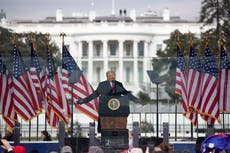The ‘big lie’ exposed: Impeachment trial hears how Trump incited violence over months with ‘stolen election’
'This wasn't about one speech': Democrats argue former president sought to make supporters believe election was 'stolen' from them, inspiring violence at Capitol as Congress certified results
House impeachment managers presenting the case against Donald Trump for his role inciting the deadly insurrection at the US Capitol on 6 January have charted an argument that spans the former president's months-long effort to undermine election results as "stolen" from his supporters, months before ballots were cast.
Impeachment managers acting as prosecutors in the former president's second impeachment trial in the US Senate have chronicled the president's big lie of election fraud that fuelled his supporters' assault on the Capitol building on 6 January.
Earlier that day, then-president Trump told supporters that the election was "pure theft" and to "make no mistake – this election was stolen from you, from me and from the country."
But impeachment managers repeated that the incitement charge against Mr Trump was never about just one speech.
Read more: Follow live updates from Trump's impeachment trial
"Each of you had heard those words before," said impeachment manager Joe Neguse. "He used this speech to incite them further, to inflame them."
In opening statements on Wednesday, impeachment managers outlined the president's campaign of lies, spurious legal challenges and attempts to pressure elections officials and members of Congress that made his followers believe their voice had been "stripped away" in the election. Congressman Joaquin Castro said: "So, they fought."
Democrats have connected the president's own history of election fraud claims to his supporters' attempts to disrupt counting ballots across the US and during a joint session of Congress on 6 January to formally certify the results.
They also referenced "stop the steal" rallies and protests as ballots were counted – including the former president's support for that campaign – as well as charging documents among people arrested for their participation in the riot who explicitly said they did it because the president told them to after buying into the big lie of a stolen election.
"These defendants themselves have told you exactly while they were here," Congressman Genuse said.
Congressman Joaquin Castro presented to the US Senate a series of Twitter posts and filmed remarks by the president, including a comment from May 2020 that the presidential election, still months away, was "rigged"; a June statement that it would be the "scandal of our times"; calling it "inaccurate and fraudulent" and the "greatest election disaster in history". Not a single ballot had yet been cast. The US Senate heard clips of the president being asked in September whether he would commit to a peaceful transfer of power.
"Get rid of the ballots ... There won’t be a transfer, frankly, there will be a continuation," he said.
The remarks "clearly come from a man who refuses to accept the possibility or reality of losing an election," Congressman Castro said.
"The most combustible thing you can do in a democracy is convince people that an election doesn't count," he said. "Especially if what you're saying are lies."
Senators heard from the former president's election night remarks in November, as ballot counting was underway across the US. He said: "They’re trying to steal the election."
"This is a fraud," he told a crowd. "Frankly, we did win this election."
Mr Castro called his behaviour a "blatant act of political intimidation."
Congressman Eric Swalwell showed senators the former president's $50 million campaign messaging and adverts telling supporters to "stop the steal" – ads that "were designed to run up to 5 January".
Eighteen days before 6 January, Trump told his supporters to show up in Washington DC: “Be there, will be wild."
"It wasn't random – it was his last chance to stop a peaceful transfer of power," Mr Swalwell said.
"He doused the flames with kerosene," he said. "This wasn't just some random guy at the neighbourhood bar, blowing off steam. This was our commander-in-chief."
Join our commenting forum
Join thought-provoking conversations, follow other Independent readers and see their replies
Comments



Bookmark popover
Removed from bookmarks